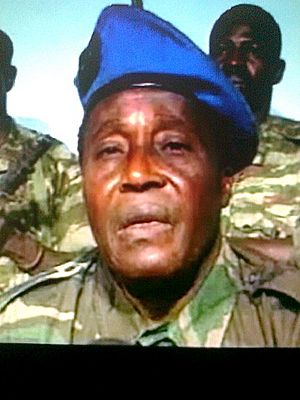Robert Guéï facts for kids
Quick facts for kids
Robert Guéï
|
|
|---|---|
 |
|
| 3rd President of Côte d'Ivoire* | |
| In office 24 December 1999 – 26 October 2000 |
|
| Prime Minister | Seydou Diarra |
| Preceded by | Henri Konan Bédié |
| Succeeded by | Laurent Gbagbo |
| Personal details | |
| Born | 16 March 1941 Man Department, French West Africa |
| Died | 19 September 2002 (aged 61) Cocody, Abidjan, Ivory Coast |
| Nationality | Ivorian |
| Political party | Independent |
| Spouse | Rose Guéï (?-2002; their deaths) |
| *President of the National Public Salvation Committee until 4 January 2000 | |
Robert Guéï was a military leader who ruled the country of Ivory Coast. He was in charge from December 1999 to October 2000. He was born on March 16, 1941, and passed away on September 19, 2002.
Contents
Early Life and Military Career
Robert Guéï was born in a village called Kabakouma in western Ivory Coast. His family was part of the Yacouba ethnic group. He chose a career in the army. He trained at military schools in Ouagadougou and also in France, at the famous St Cyr military school.
Guéï was a strong supporter of Ivory Coast's first president, Félix Houphouët-Boigny. In 1990, President Houphouët-Boigny made Guéï the chief of the army. This happened after some soldiers had caused trouble.
Political Changes and Dismissal
After President Houphouët-Boigny died in 1993, a new leader named Henri Konan Bédié took over. Robert Guéï and President Bédié did not get along as well.
In October 1995, there was a political disagreement between President Bédié and another important leader, Alassane Ouattara. Guéï refused to use his troops to get involved in this fight. Because of this, he was removed from his position. He was briefly made a minister, but then he was fired again in August 1996. By January 1997, he was forced to leave the army completely.
Becoming President
On Christmas Eve in 1999, President Bédié was removed from power in a sudden military takeover, known as a coup. Robert Guéï was not involved in planning this coup. However, he was a popular general, and people encouraged him to come out of retirement. He was asked to lead the country temporarily until new elections could be held.
On January 4, 2000, Robert Guéï officially became the President of the Republic.
The 2000 Election and Aftermath
In October 2000, Robert Guéï ran for president in the 2000 Ivorian presidential election. He ran as an independent candidate. He only allowed one other main candidate to run against him: Laurent Gbagbo.
Laurent Gbagbo won the election by a large number of votes. However, Guéï refused to accept the results. Many people protested in the streets to demand that Gbagbo become president. Eventually, Laurent Gbagbo took power.
After this, Guéï left the capital city and went to a town called Gouessesso, near the border with Liberia. Even though he was no longer president, he remained an important person in the country's politics. In 2001, he took part in a meeting to help bring peace to the country. He agreed not to use undemocratic ways to gain power.
Death and Legacy
In September 2002, Robert Guéï decided to no longer follow the peace agreement. On September 19, 2002, he was killed in the city of Abidjan. His wife, Rose Doudou Guéï, who was the former First Lady, and their children were also killed that day. This happened at the very beginning of the First Ivorian Civil War.
The exact reasons and details of his death are still not fully clear. However, it is generally believed that forces loyal to Laurent Gbagbo were involved. Several other members of Guéï's family and the interior minister, Émile Boga Doudou, also died.
After his death, Robert Guéï's body was kept in a morgue for almost four years. A funeral was finally held for him in Abidjan on August 18, 2006.
See also
- First Ivorian Civil War
- In Spanish: Robert Guéï para niños
 | Sharif Bey |
 | Hale Woodruff |
 | Richmond Barthé |
 | Purvis Young |

